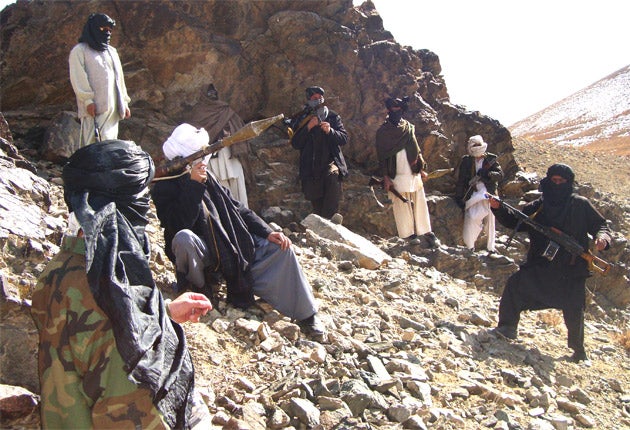Nato 'duped by impostor who posed as Taliban negotiator'
Embarrassment over claim that grocer from Pakistan attended talks and was given cash

Your support helps us to tell the story
From reproductive rights to climate change to Big Tech, The Independent is on the ground when the story is developing. Whether it's investigating the financials of Elon Musk's pro-Trump PAC or producing our latest documentary, 'The A Word', which shines a light on the American women fighting for reproductive rights, we know how important it is to parse out the facts from the messaging.
At such a critical moment in US history, we need reporters on the ground. Your donation allows us to keep sending journalists to speak to both sides of the story.
The Independent is trusted by Americans across the entire political spectrum. And unlike many other quality news outlets, we choose not to lock Americans out of our reporting and analysis with paywalls. We believe quality journalism should be available to everyone, paid for by those who can afford it.
Your support makes all the difference.He may be a Taliban agent sent to sabotage hopes of a peace deal; he might be on the payroll of Pakistan's top intelligence agency; or he could just be a happy-go-lucky shopkeeper from Quetta, out to pocket some hard cash.
But it emerged yesterday that the mystery figure Afghan and Western officials had believed was Mullah Akhtar Muhammad Mansour, a Taliban supremo come to talk peace and on whom they had pinned so many hopes of détente, reconciliation and an end to Afghanistan's deepening violence, was someone else altogether.
The revelation, which appeared in The New York Times, is embarrassing for a host of Afghan and Western officials, including President Hamid Karzai, who has made reconciliation with his "Taliban brothers" a cornerstone of his presidency. It is also a setback for US General David Petraeus who had touted a breakthrough in peace talks as evidence his counter-insurgency strategy is working.
Although Afghan officials have been more circumspect about talks than Nato officials and Western diplomats, calling them little more than "networking" opportunities, the presence of Mullah Mansour at the table was a source of optimism for all. Now all parties have reluctantly agreed that "it's not him", as a Western diplomat in Kabul, apparently intimately involved in the discussions, put it. "And we gave him a lot of money."
Doubts about the man who claimed to be Mansour arose after his third meeting with Afghan officials in Kandahar, when a member of the group who had once known him told other attendees that the man at the table was not the same man. Others who knew Mansour and were shown the man's picture agreed. Afghan officials later said they believed he was a lowly grocer from the Pakistani town of Quetta.
But the impostor had already so convinced officials that he was a high-level commander who spoke for the Taliban movement that Nato flew him to Kabul on a British aircraft. Once there, Nato officials said, he was ushered into the presidential palace to meet Mr Karzai.
Yesterday, the President denied a meeting took place. "I did not see Mullah Akhtar Mohammad Mansour and Mullah Mansour did not come to Afghanistan. Don't accept this news from the foreign press regarding meetings with the elders of the Taliban because most of them are propaganda," he said.
Identifying who is who in the Taliban's shadow world is a difficult proposition. The movement was infamous in the 1990s for its secrecy, and there are few pictures of some of its most prominent members. Mullah Mohammad Omar, the group's reclusive leader, is known to the world by a single, grainy black and white photo.
The problem extends down to the Taliban's rank and file, with many purported Taliban fighters agreeing to give up their fight and pocket reintegration bonuses, only for it to transpire that they were not insurgents in the first place.
Talks with the Taliban are part of a wider peace plan under Karzai that includes bringing Taliban foot soldiers in from the cold with an offer of jobs and an amnesty, and inviting senior commanders to hammer out a political settlement.
But the Taliban have consistently rejected the overtures, as well as claims that they are secretly meeting with members of the Afghan government. "The cunning enemy which has occupied our country, is trying, on the one hand, to expand its military operations on the basis of its double-standard policy and, on the other hand, wants to throw dust into the eyes of the people by spreading the rumours of negotiation," Mullah Omar told followers in a recent message.
Mullah Mansour, a civil aviation minister when the Taliban were in power, sits on the group's ruling council in Pakistan and is seen as one of its most senior figures. In February he was passed over for promotion following the arrest of Mullah Omar's deputy. Instead the position went to Maulvi Zakir Qayyum, a former Guantanamo detainee released into Afghan custody in 2007. Qayyum served four months in an Afghan jail before being released – and promptly rejoined the Taliban.
"One would suspect that in our multibillion-dollar intelligence community there would be the means to differentiate between an authentic Quetta Shura emissary and a shopkeeper," a US official in Kabul told The Washington Post. "On the other hand, it doesn't surprise me. It may have been Mullah Omar posing as a shopkeeper; I'm sure our intelligence whizzes wouldn't have known."
Join our commenting forum
Join thought-provoking conversations, follow other Independent readers and see their replies
Comments